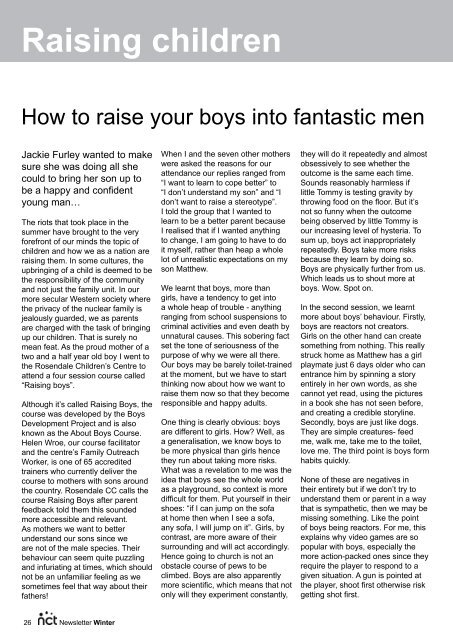Autumn 2011 - Mandy Mazliah
Autumn 2011 - Mandy Mazliah
Autumn 2011 - Mandy Mazliah
Create successful ePaper yourself
Turn your PDF publications into a flip-book with our unique Google optimized e-Paper software.
Raising children<br />
How to raise your boys into fantastic men<br />
Jackie Furley wanted to make<br />
sure she was doing all she<br />
could to bring her son up to<br />
be a happy and confident<br />
young man…<br />
The riots that took place in the<br />
summer have brought to the very<br />
forefront of our minds the topic of<br />
children and how we as a nation are<br />
raising them. In some cultures, the<br />
upbringing of a child is deemed to be<br />
the responsibility of the community<br />
and not just the family unit. In our<br />
more secular Western society where<br />
the privacy of the nuclear family is<br />
jealously guarded, we as parents<br />
are charged with the task of bringing<br />
up our children. That is surely no<br />
mean feat. As the proud mother of a<br />
two and a half year old boy I went to<br />
the Rosendale Children’s Centre to<br />
attend a four session course called<br />
“Raising boys”.<br />
Although it’s called Raising Boys, the<br />
course was developed by the Boys<br />
Development Project and is also<br />
known as the About Boys Course.<br />
Helen Wroe, our course facilitator<br />
and the centre’s Family Outreach<br />
Worker, is one of 65 accredited<br />
trainers who currently deliver the<br />
course to mothers with sons around<br />
the country. Rosendale CC calls the<br />
course Raising Boys after parent<br />
feedback told them this sounded<br />
more accessible and relevant.<br />
As mothers we want to better<br />
understand our sons since we<br />
are not of the male species. Their<br />
behaviour can seem quite puzzling<br />
and infuriating at times, which should<br />
not be an unfamiliar feeling as we<br />
sometimes feel that way about their<br />
fathers!<br />
When I and the seven other mothers<br />
were asked the reasons for our<br />
attendance our replies ranged from<br />
“I want to learn to cope better” to<br />
“I don’t understand my son” and “I<br />
don’t want to raise a stereotype”.<br />
I told the group that I wanted to<br />
learn to be a better parent because<br />
I realised that if I wanted anything<br />
to change, I am going to have to do<br />
it myself, rather than heap a whole<br />
lot of unrealistic expectations on my<br />
son Matthew.<br />
We learnt that boys, more than<br />
girls, have a tendency to get into<br />
a whole heap of trouble - anything<br />
ranging from school suspensions to<br />
criminal activities and even death by<br />
unnatural causes. This sobering fact<br />
set the tone of seriousness of the<br />
purpose of why we were all there.<br />
Our boys may be barely toilet-trained<br />
at the moment, but we have to start<br />
thinking now about how we want to<br />
raise them now so that they become<br />
responsible and happy adults.<br />
One thing is clearly obvious: boys<br />
are different to girls. How? Well, as<br />
a generalisation, we know boys to<br />
be more physical than girls hence<br />
they run about taking more risks.<br />
What was a revelation to me was the<br />
idea that boys see the whole world<br />
as a playground, so context is more<br />
difficult for them. Put yourself in their<br />
shoes: “if I can jump on the sofa<br />
at home then when I see a sofa,<br />
any sofa, I will jump on it”. Girls, by<br />
contrast, are more aware of their<br />
surrounding and will act accordingly.<br />
Hence going to church is not an<br />
obstacle course of pews to be<br />
climbed. Boys are also apparently<br />
more scientific, which means that not<br />
only will they experiment constantly,<br />
they will do it repeatedly and almost<br />
obsessively to see whether the<br />
outcome is the same each time.<br />
Sounds reasonably harmless if<br />
little Tommy is testing gravity by<br />
throwing food on the floor. But it’s<br />
not so funny when the outcome<br />
being observed by little Tommy is<br />
our increasing level of hysteria. To<br />
sum up, boys act inappropriately<br />
repeatedly. Boys take more risks<br />
because they learn by doing so.<br />
Boys are physically further from us.<br />
Which leads us to shout more at<br />
boys. Wow. Spot on.<br />
In the second session, we learnt<br />
more about boys’ behaviour. Firstly,<br />
boys are reactors not creators.<br />
Girls on the other hand can create<br />
something from nothing. This really<br />
struck home as Matthew has a girl<br />
playmate just 6 days older who can<br />
entrance him by spinning a story<br />
entirely in her own words, as she<br />
cannot yet read, using the pictures<br />
in a book she has not seen before,<br />
and creating a credible storyline.<br />
Secondly, boys are just like dogs.<br />
They are simple creatures- feed<br />
me, walk me, take me to the toilet,<br />
love me. The third point is boys form<br />
habits quickly.<br />
None of these are negatives in<br />
their entirety but if we don’t try to<br />
understand them or parent in a way<br />
that is sympathetic, then we may be<br />
missing something. Like the point<br />
of boys being reactors. For me, this<br />
explains why video games are so<br />
popular with boys, especially the<br />
more action-packed ones since they<br />
require the player to respond to a<br />
given situation. A gun is pointed at<br />
the player, shoot first otherwise risk<br />
getting shot first.<br />
26 Newsletter Winter





